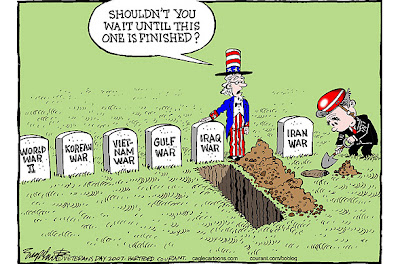
search
Saturday, November 17, 2007
Thursday, November 15, 2007
West opposed to Iran-IAEA constructive cooperation
link
Ahmadinejad:Iran Monitoring US Military Moves in Region
Iran Starts Industrial Enrichment
Government spokesman Gholam Hossein Elham :
"We are moving on a path which leads to industrial (enrichment) technology and we want to use this technology for our nuclear power plants in a peaceful way and within the regulations," Elham said in response to the question if Iran intends to increase the number of its centrifuges to over 3,000.
source
Wednesday, November 14, 2007
Monday, November 12, 2007
Israel 's anger indicates ElBaradei’s report is positive
| Harsh attacks against the IAEA and its Director General Mohamed ElBaradei by the Zionist officials indicates that the agency’s report is in favor of Iran, said MP Heshmatollah Falahatpisheh here on Monday. | |
“This position indicates that the International Atomic Energy Agency director general’s report will be in favor of Iran,” Falahatpisheh, a member of the Majlis National Security and Foreign Policy Committee, told the Mehr News Agency. The IAEA is set to release its report to the IAEA Board of Governors on November 23 and 24. On nuclear proposals by European foreign policy chief Javier Solana and Saudi Arabian Foreign Minister Saud al Faisal, he said the security committee plans to review both proposals so to “see what their nature is.” If the plans are intended to deprive Saudi foreign minister said recently that his country and the other five members of the Persian Gulf Cooperation Council had suggested setting up a consortium, possibly based in Asked if Russian President Vladimir Putin in his recent trip to |
http://www.mehrnews.com/en
The lonesome cowboy of the Middle East
| As the crises become more acute in the Middle East and South Asia and developments rapidly change in the region, the United States is on the precipice of a major foreign policy and security crisis. | |
The critical situation in Pakistan, the uncertain future of Pervez Musharraf’s government, the rise in bombings in Afghanistan, the fact that the Turkish army is on alert on the border of northern Iraq, the dispute over the presidential election in Lebanon, and the increased tension in the occupied territories of Palestine are giving rise to a situation that will shake the position of the U.S. in the region. If instability rises in Of course, recent developments in northern This has caused problems for In Events in The increased violence in In In fact, it is the interference of the In With the situation about to spin out of control in the Clearly, if the Now many of Bush’s old associates blame him for his aggressive policies that have been implemented throughout the world and believe that the current situation is harmful to Thus, it is not surprising that Bush’s friends have dubbed him the lonesome cowboy of the |
http://www.mehrnews.com/en
Ahmadinejad: Iran should get ready for its global missions
"We should first resolve our geopolitical issues and then prepare ourselves for the next move," he said.
The enemies try to convince the world that the Islamic Republic of Iran is not capable of handling its own affairs, he said, adding that "In my belief the God Almighty will humiliate the big powers." The enemies try to create obstacles to deviate Iran from path of development and success, said the president. keep reading
Iran keen to boost ties with Africa
President Ahmadinejad told a group of ministers attending the Seminar of Iran-Africa Trade Opportunities that Iran and African states, which have abundant financial and human resources, are in today's world in need of very serious, all-out and close cooperation. keep reading
Anti-war activists do battle over intervention in Iran
An acrimonious war of words has broken out between notable luminaries within the anti-war movement after the Stop the War Coalition refused to allow a group that campaigns against military intervention in Iran to join its ranks.
The decision has prompted a number of prominent activists, including Peter Tatchell and Michael Mansfield QC, to accuse the coalition of being apologists for the Iranian government by "refusing to allow any criticism" of the Tehran regime.
Hands Off the People of Iran (Hopi), a small group of predominantly Iranian exiles who campaign for regime change in Iran but are against external military intervention, were told last month they could not be affiliated to the Stop the War Coalition after their application was rejected by a vote at the anti-war coalition's annual meeting. Members of Hopi said they have been "excommunicated" because of their vociferous opposition to the Tehran regime.
Iran Has a Right to Seek N. Technology
As if that didn't illustrate enough the tensions of the nuclear age, two Bush administration officials - United Nations Ambassador Zalmay Khalilzad and deputy State Department spokesman Tom Casey - made simultaneous remarks that illuminated the nuclear double standard more starkly than ever. keep reading
British MPs Underline Iran's N. Rights
Sunday, November 11, 2007
Mofaz’s shameful and arrogant suggestions
Since Tehran and the International Atomic Energy Agency signed a deal on August 21 to clear up the remaining questions about Iran’s nuclear activities Israel and U.S. became too angry and started leveling charges against the IAEA and its director Mohamed ElBaradei.
This angriness and impudence is becoming more and more naked as Iran and the IAEA are actually succeeding to resolve all differences one by one, especially after ElBaradei stressed in an interview with CNN on October 28 that there is no evidence that Iran is building nuclear weapons keep reading
US Will Not Win Iran War
Bush extends Iranian asset freeze
The measure was ordered by then president Jimmy Carter on November 14, 1979, 10 days after students took over the U.S. embassy in Tehran where they eventually held about 60 hostages for 444 days. The crisis led to the end of U.S.-Iranian diplomatic relations in 1980. The asset freeze, which has been renewed every year, is a source of resentment in Iran. Washington has since reinforced a sanctions regime on the Islamic Republic. The United States is also pushing for UN sanctions to punish Iran for its refusal to halt its nuclear program.source
The 5+1 Has Accepted 3.000 Centrifuges for Iran”

- Russian Foreign Affairs Minister was the last high-ranking personality who met Mr. Ahmadinejad on 30 October
- Iran had put into operation more than 3,000 centrifuges and every week we install a new series, Mr. Ahmadinejad had said last month.
Paris, 7 Nov. (IPS) The United States has sent a message to Iran, saying they are ready for talks in case Iran “stops its nuclear activities at 3.000 centrifuges“, the fanatic Iranian President Mahmoud Ahmadinejad revealed Wednesday.
“The Big Ill-humoured (the new name Ahmadinejad is bestowing to the United States) has sent a message to the Islamic Republic, saying if you stop at the level of 3.000 centrifuges, we are ready to talk (to you) “, the President told people at Birjand, the capital city of the Southern Khorasan Province, bordering with Afghanistan.
“On behalf of the Iranian people, I told those who brought the message that we had not asked anybody to talk to put conditions for us”, Mr. Ahmadinejad said. keep reading
The Iranian Challenge
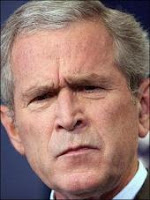
- Although the ruling clergy in Iran are very unpopular, they are not going anywhere anytime soon.
- Iran often conceals its real objectives behind layers of ideological rhetoric, with the aim of confusing potential enemies
- Intrusive inspections is the best tool to ensure that Iran doesn't divert its civilian program into a military one.
Iran will be the top foreign policy challenge for the United States in the coming years. Washington’s failure to understand Iran is partly because it for a long time could afford to ignore that country – and adopt self-serving and ultimately false assumptions about Tehran.
Today, Washington can no longer afford to be in the dark about the realities of Iran. For the next President of the United States to be successful in dealing with Iran, he or she must first reassess these assumptions before a new policy can be adopted.
In the piece below, published in a special edition of The Nation Magazine, he discusses these assumptions and describes how Washington can change Iran’s behavior by modifying its own.keep reading
IRGC Commander Highlights Iran's Security
 Commander-in-chief of the Islamic Revolutionary Guards Corps (IRGC) Major General Mohammad Ali Jafari :
Commander-in-chief of the Islamic Revolutionary Guards Corps (IRGC) Major General Mohammad Ali Jafari :Friday, November 9, 2007
Iranian envoy says Iran playing key role in regional equations
 Iran's Ambassador to Baghdad Hassan Kazemi Qomi :
Iran's Ambassador to Baghdad Hassan Kazemi Qomi :Highlighting stance of Iran at Istanbul conference, he said Iran has adopted crystal clear and supportive stands in dealing with Iraq's neighbors but the latest proposal to save Iraq from current situation demonstrates Iran's significant role in regional equations.
Iran's stands at Istanbul conference focused on administration of Iraq's internal affairs by the Baghdad government, withdrawal of foreign troops from Iraq, forging the country's national unity and solidarity, postponement of referendum on future of Kirkuk and campaign against terrorism, he said.
Iran also called on neighboring states to contribute to Iraq's reconstruction, play an active role in restoring security to the war-stricken country, reopen their embassies and help rehabilitate Iraqi army.
In the conference, Iran's humanitarian aid and assistance were outlined for the audience, Qomi pointed out.
"We are now trying to liberate Iranian diplomats kidnapped by US troops in Iraq," Qomi underlined.
The Iraqi president who is pursuing the case is very optimistic about settlement of the issue and release of the Iranian diplomats as soon as possible, he said.
Reliable resources declare that the kidnapped Iranian diplomats might be freed on Friday.
No discord among Iranian officials on nuclear issue
| Iran says there is no discord among high-ranking Iranian officials over the country’s nuclear issue. | |
As an active signatory to the NPT, He also noted that |
Wednesday, November 7, 2007
Iran will study any offer guaranteeing its nuclear rights
| Iran will consider all proposals that will guarantee its nuclear rights, Foreign Ministry Spokesman Mohammad-Ali Hosseini said on Monday. | |
President Mahmud Ahmadinejad’s offer, which was made two years ago, on the establishment of a nuclear consortium still exists, Hosseini told reporters in reference to a similar offer by Saudi foreign minister to set up a consortium to provide enriched uranium for Region can not tolerate more crises Hosseini shrugged off the foreign media propaganda about a possible |
Ahmadinejad: Iran's N. Progress Irrevocable
 Iran's President Mahmoud Ahmadinejad underlined here on Wednesday that his country may not retreat along the nuclear path.
Iran's President Mahmoud Ahmadinejad underlined here on Wednesday that his country may not retreat along the nuclear path. Iran's Power to Strike US Interests
"The Islamic Republic of Iran is not seeking to create tension in the region…while it has organized its defensive preparedness and capabilities in such a way that it is capable of pushing enemy into withdrawal," General Masoud Jazayeri said. keep reading
Tuesday, November 6, 2007
West opposes legal investigation of Iran nuclear dossier: expert
Political directors from 5+1 group (the five permanent UN Security Council members plus Germany) met in London on Friday to discuss new sanctions against Iran over its nuclear program. However, China and Russia objected calls for a new set of sanctions on Iran.
The 5+1 group would push for a third UN Security Council resolution unless the forthcoming reports from European Union foreign policy chief Javier Solana and the head of UN atomic watchdog Mohamed ElBaradei showed ""a positive outcome"". keep reading
Enemy Troops Escape after Iran's Warning
 Commander of the Iranian army :
Commander of the Iranian army :The General did not mention the name of the neighboring country or nationality of the troops, but he seemed to be pointing to the US or British troops deployed at Iran-Iraq borders as he used the word "alien" - an adjective normally used by Iranian officials to describe trans-regional foes, the US to be precise. source
Ahmadinejad: Iranians prepared to safeguard their faith, virtues
 President Mahmoud Ahmadinejad :
President Mahmoud Ahmadinejad :Iranian nation are well-prepared to safeguard their faith and virtues, which are the key to their prosperity.
Addressing huge gathering of people at the mass funeral ceremony of 65 martyrs of the eight-year Sacred Defense here on Tuesday, President Ahmadinejad said Iranian nation should remain loyal to the lofty ideals and goals of martyrs.
President Ahmadinejad said faith and spirituality are the key to chastity of mankind in today's world.
Monday, November 5, 2007
Iran Decides Next US President
Is preventing a nuclear Iran a do-or-die situation? I think most independent Americans recognize that it is. This creates a serious political problem for both parties. If Bush takes any visible action before the end of his term (and sooner is always better in terms of strategy), the war with Iran becomes Bush’s war, like Iraq, and the Republicans lose the next election. However, if Bush refuses to act, the Democrats are forced to take a position on Iran, and, with their large anti-war base, are put in a no-win situation, where they have to choose between subtantial percentage of their base or the majority of independents. This is why both Hillary and Armadinejad would like to goad Bush into taking action before the next election. Interesting situation, isn’t it? source
Sunday, November 4, 2007
Anniversary of 'Students Day' honored

They issued a five-point statement at the end of the rally.
"Almost three decades after victory of the Islamic Revolution and passing through crises and struggle with hostile approach of the enemies in both software and hardware areas, the revolutionary awakening has dealt a blow to the western liberal democracy.
"The Islamic Revolution took place in the East during the 20th century, an era referred to as the end of morality, ethics and religion. It served the beginning of the revolutionary and religious teachings whose message was campaign against bullying and
war-mongering powers," the statement said.
It said that November 4, 1978 served as a turning point of the Islamic Revolution culminated in February 11, 1979 and it was symbol of solidarity, wisdom, insight and campaign against tyranny.
"The scandal of Abu Ghraib prison, Iraq and Guantanamo Bay, Cuba, Qana, Holocaust and Palestine are stains in the face of so-called western humanism which has ignored rights of nations in the past half century. What feature in the western world is the superiority of wealth and power to control the nations and plunder their wealth." The statement said that the Islamic Revolution and the tenets of late Imam Khomeini are flourishing in an era which is thirsty for morality, ethics and religion and the growing conversion to Islam of the Europeans and Americans indicates how the people embrace Islam
Iranian nation firm to gain its nuclear rights

Addressing a ceremony marking the Aban 13 (November 4) takeover of former US embassy in Tehran, Pourmohammadi said :
Americans had in the nuclear case piled up high pressure on Iran so as to bring it to its knees.
when the US and its allies realized that they cannot push another resolution against Iran through the UN Security Council, they started to take the illegal and political action of issuing unilateral sanctions against Iran over its peaceful nuclear program.
Iranians are confident that such sanctions would not be the least effective.
Iranian nation has shown in practice that is capable of withstanding sanctions. Officials, however, should try to take necessary arrangements and plans so as to prevent any halt in the country's development.
US Seeks Control over Mideast Oil under Pretext of Al-Qaeda
 An Iranian MP said that the Untied States sought to dominate the Middle-East and its oil reserves under the pretext of campaign against terrorism, al-Qaeda and Bin Laden in particular.
An Iranian MP said that the Untied States sought to dominate the Middle-East and its oil reserves under the pretext of campaign against terrorism, al-Qaeda and Bin Laden in particular. Attacking Iran Is A Really, Really Bad Idea
The best-case upside is that Iran is disarmed permanently, and everyone shrugs their shoulders and accepts it. What are the chances, really, that will happen?
The worst-case downside is appallingly bad. It could rally the Iranian population behind that mullahs - a population that right now is very unhappy with their leadership, and somewhat pro-American. That would all be swept away, and even worse, it could rally the majority Sunni muslims behind the minority Shi'ites in Iran in a way no other event possibly could. It would be the polarization of the West versus Islam that Osama bin Laden has long been seeking. It could end the disunity in the Muslim world that thus far has worked to the West's advantage. keep reading
Ahmadinejad Blasts Powers' Misuse of Media
 Iranian President Mahmoud Ahmadinejad said bullying powers make an instrumental use of the world media in a bid to humiliate other nations and cultures and to channel world relations into their own interests through distorting realities. keep reading
Iranian President Mahmoud Ahmadinejad said bullying powers make an instrumental use of the world media in a bid to humiliate other nations and cultures and to channel world relations into their own interests through distorting realities. keep reading
Saturday, November 3, 2007
Iran is bad ,Pakistan is good
 There’s some really interesting commentary over on Reddit about the discrepancy between how USA treat Iran and how USA treat Pakistan. Here are some of the quotes that highlight the issue:
There’s some really interesting commentary over on Reddit about the discrepancy between how USA treat Iran and how USA treat Pakistan. Here are some of the quotes that highlight the issue:
Pakistan has a military dictator who came to power in a coup, Iran has a democratically elected President.- Pakistan has nuclear weapons, Iran may be acquiring the “knowledge” of nuclear, but according to El Baradei (UN’s nuclear inspector) there is no evidence of nuclear bombs.
- Pakistan supported the Taliban and currently harbors Bin Laden, Iran was openly hostile to the Taliban.
- America supports Pakistan and wants to bomb Iran “back to the stone age. WTF?
- The leader of Pakistan is the president and the leader of Iran is not.
- Iran has oil. Pakistan doesn’t.
- Iran does not do what the USA tells it to do. Pakistan does.
Should USA be more concerned about Pakistan (and their existing nuclear weapons) falling into the hands of radical Muslims than of Iran getting some in the future? Isn’t that a major concern if Musharraf were to lose power?
Friday, November 2, 2007
Rafsanjani Highlights Iran's Military Achievements
Thursday, November 1, 2007
Iran warns U.S. of "quagmire" if attacked
 Iran warned the United States on Wednesday it would find itself in a “quagmire deeper than Iraq” if it attacked the Islamic state, and Russia stepped up efforts for a diplomatic solution to Tehran’s nuclear row with the West.
Iran warned the United States on Wednesday it would find itself in a “quagmire deeper than Iraq” if it attacked the Islamic state, and Russia stepped up efforts for a diplomatic solution to Tehran’s nuclear row with the West. The warning by the head of Iran’s elite Revolutionary Guards, a target of new U.S. sanctions announced last week, added to angry rhetoric between the two old foes that has prompted speculation of possible U.S. military action.
Attacking Iran for Israel?
 With 200-300 nuclear weapons in their arsenal, Israelis enjoy a nuclear monopoly in the Middle East. They mean to keep it that way, and they want the U.S. to help.
With 200-300 nuclear weapons in their arsenal, Israelis enjoy a nuclear monopoly in the Middle East. They mean to keep it that way, and they want the U.S. to help. To gauge someone's reliability, one depends largely on prior experience. Sadly, Rice's credibility suffers in comparison with Mohammed ElBaradei, head of the International Atomic Energy Agency (IAEA). Basing his judgment on the findings of IAEA inspectors in Iran, ElBaradei reports that there is no evidence of an active nuclear weapons program there.
If this sounds familiar, it is in fact déjà vu. ElBaradei said the same thing about Iraq before it was attacked. But three days before the invasion, American nuclear expert Dick Cheney told NBC's Tim Russert, "I think Mr. ElBaradei is, frankly, wrong." keep reading.....
Bush Regime Targets Iran After 9/11
- Iran, 9/11 and the "War on Terror" .........
- After Iraq, Debating Iran........
- The Fateful Decisions of May 2003.......
Iranian graphic designer wins top Dutch award
The 40-year-old Abedini who teaches at Tehran University is to receive the prize on December 13 during a special ceremony.
The 100,000 euro 'Prince Claus Award' which dates back to 10 years ago, is funded by the Dutch royal family aimed at promoting cultural exchange between Europe and the other continents.
German Orient X Press magazine
Iranian Supreme Leader Dismisses US Claims about Iran
 Supreme Leader of the Islamic Revolution Ayatollah Seyed Ali Khamenei here Wednesday strongly rejected the recent claims made by the US about Iran's involvement in military nuclear activities and the killing of US soldiers in Iraq.
Supreme Leader of the Islamic Revolution Ayatollah Seyed Ali Khamenei here Wednesday strongly rejected the recent claims made by the US about Iran's involvement in military nuclear activities and the killing of US soldiers in Iraq. Wednesday, October 31, 2007
France Badly Discredited by Obedience to US

US Made to Change Game after Iran's Cooperation with IAEA

Tuesday, October 30, 2007
India-Pakistan-Iran Pipeline Project , Will it work ?
 The India-Pakistan-Iran pipeline project is facing serious hurdles including pricing and fierce opposition of the U.S. government for some times. For India, Iran, world’s second largest oil and gas proven reserves, is a big market and an important access route to Central Asia and Afghanistan.
The India-Pakistan-Iran pipeline project is facing serious hurdles including pricing and fierce opposition of the U.S. government for some times. For India, Iran, world’s second largest oil and gas proven reserves, is a big market and an important access route to Central Asia and Afghanistan. According to some political experts, the IPI project will be proved as the mother of all confidence-building measures between these two neighboring countries. They have even called the IPI project as the ‘Peace Pipeline’
The U.S. concerns over the IPI project is not linked to the economic side of the deal but to Washington’s Iran policy. The US has had not good relations with Iran since the 1979 revolution. In past some years, the US administration has been accusing Iran for carrying nuclear-weapon ambitions.
India has come under greater pressure because of the development of bilateral relations with US. The Indo-US nuclear deal, which gives India’s nuclear capability a legitimacy, the first one outside the Non-Proliferation Treaty, may force India to come out of the Iran pipeline deal.
The IPI is being perceived as running against this broad strategic American perspective where India is being emerged as an ally to counter China’s rising power and Iran regional importance.
However, the fact of the matter is that regional pipelines actually contribute to the sustainable growth and stability of the linked regions. The IPI project will do the same for the three countries involved in the project for sure. more
On Track for U.S Collapse
ElBaradei urges full transparency from Iran
 Oct 29 - The head of the U.N. nuclear watchdog said on Monday Iran's agreement on a plan to resolve questions about its nuclear program was important but "active cooperation and transparency" would be key to its success.
Oct 29 - The head of the U.N. nuclear watchdog said on Monday Iran's agreement on a plan to resolve questions about its nuclear program was important but "active cooperation and transparency" would be key to its success.In a speech to the U.N. General Assembly in New York, Mohamed ElBaradei, the chief of the International Atomic Energy Agency, said it was regrettable that Iran had not suspended uranium enrichment and was continuing to build a heavy water reactor at Arak, contrary to Security Council decisions.
He said Iran had recently provided additional information and access to resolve "a number of outstanding issues, such as the scope and nature of past plutonium experiments." "While the agency so far has been unable to verify certain important aspects relevant to the scope and nature of Iran's nuclear program, Iran and the secretariat (of the IAEA) agreed in August on a work plan for resolving all outstanding verification issues," ElBaradei said.
He said those issues were at the core of lack of international confidence about Iran's program. Washington and other Western countries suspect Tehran is developing nuclear weapons, a charge that Iran has denied.
ElBaradei said Iran's agreement on a work plan with a defined timeline for addressing the various issues was "an important step in the right direction." "Naturally, Iran's active cooperation and transparency are key in this regard," he said. He said that if the IAEA was able to provide "credible assurance" that Iran's nuclear work was peaceful, it would help build international confidence and "create the conditions for a comprehensive and durable solution." ElBaradei has said Iran was years away from having the ability to produce a nuclear weapons and that there was still no evidence Tehran was building a bomb
source
Globalists attempting to depopulate the world
 Leuren Moret is an American independent scientist and international expert on radiation and public health issues.
Leuren Moret is an American independent scientist and international expert on radiation and public health issues.She has devoted her life to awakening the public to the destructive consequences of the depleted uranium munitions used by the U.S. military and has made relentless efforts to stop the United States from destroying the environment. Following is the text of a Press TV interview with Leuren Moret published on October 25:
Sanctions against Iran Indicative of US Paralysis
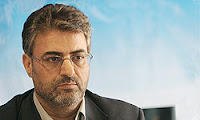
Monday, October 29, 2007
Iran says the US backing terrorists
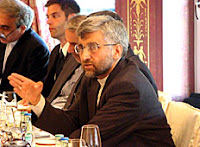
Sunday, October 28, 2007
DEJA VU? NO EVIDENCE IRAN IS BUILDING NUKES.
 Chief UN atomic watchdog Mohamed ElBaradei said Sunday he had no evidence that Iran is building nuclear weapons and accused US leaders of adding “fuel to the fire” with recent bellicose rhetoric.
Chief UN atomic watchdog Mohamed ElBaradei said Sunday he had no evidence that Iran is building nuclear weapons and accused US leaders of adding “fuel to the fire” with recent bellicose rhetoric. “Even if Iran were to be working on a nuclear weapon … they are at least a few years from having such a weapon [..] at this stage we need to continue to work through creative diplomacy … as I don’t see any other solution than diplomacy and inspections.”
The White House rejects the idea that “Iran rhetoric” is similar to our build up prior to invading Iraq.
The world is rightly concerned that the United States might pick another fight in the middle eastread more
US WAR ON IRAN : Closer to Reality
Washington society has been chattering about the risk of war with Tehran. It's an open secret that Vice President Dick Cheney has made bombing plans, but even high-ranking military experts think an attack would lead to world economic chaos, or even what George W. Bush calls 'World War III.
Shirin Ebadi: Iranians will Respond to Aggressors
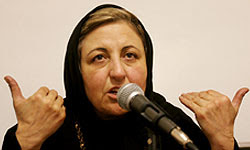 The Iranian Nobel Peace Laureate Shirin Ebadi warned West, specially France, against invasion of Iran, stressing that in case of an enemy attack, the Iranian people will give a proper response to the aggressors
The Iranian Nobel Peace Laureate Shirin Ebadi warned West, specially France, against invasion of Iran, stressing that in case of an enemy attack, the Iranian people will give a proper response to the aggressorsGerman FM Warns against Military Action against Iran
 German Foreign Minister Frank-Walter Steinmeier on Saturday warned against any "military adventures" against Iran over its nuclear programs.
German Foreign Minister Frank-Walter Steinmeier on Saturday warned against any "military adventures" against Iran over its nuclear programs. Iran says ME tensions will propel oil price to $120

Iran urges US to find strategy to resolve its regional problems
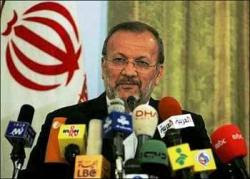 Mottaki recommended the United States to find a strategy for resolving its problems in the region.
Mottaki recommended the United States to find a strategy for resolving its problems in the region.Iranian Foreign Minister Manouchehr Mottaki :
Sanctions will not resolve US problems. Americans (officials) should respect Iran's rights and the Islamic Iran asks for nothing other than its rights." "Condemning an official institution of a country's military forces at the parliament of another country against international laws and regulations will not be supported by international community.
"If you develop a wrong approach, this wrong approach can be repeated in other places.
There are two approaches for dealing with issues, "One is to have interaction and the other to confront." "We have chosen the first option which is supported by the international community. Therefore, we advise Americans (officials) to avoid further isolating themselves .
irna
Saturday, October 27, 2007
Iranian missiles no threats to any countries
 Iran Defense Minister Brigadier General Mostafa Mohammad NajjarIranian :
Iran Defense Minister Brigadier General Mostafa Mohammad NajjarIranian :Those rhetorics were only aimed at "justifying the US plans to make a missile shield in the Republic of Czech, a plan which is increasingly opposed by European public opinion,"
ad
Blog Archive
-
▼
2007
(68)
-
▼
November
(41)
- time.com cartoon of the week
- West opposed to Iran-IAEA constructive cooperation
- Ahmadinejad:Iran Monitoring US Military Moves in R...
- Iran Starts Industrial Enrichment
- cartoon
- USA soldiers in persian golf
- Israel 's anger indicates ElBaradei’s report is po...
- The lonesome cowboy of the Middle East
- Ahmadinejad: Iran should get ready for its global ...
- Iran keen to boost ties with Africa
- Anti-war activists do battle over intervention in ...
- Iran Has a Right to Seek N. Technology
- British MPs Underline Iran's N. Rights
- Mofaz’s shameful and arrogant suggestions
- US Will Not Win Iran War
- Bush extends Iranian asset freeze
- The 5+1 Has Accepted 3.000 Centrifuges for Iran”
- The Iranian Challenge
- IRGC Commander Highlights Iran's Security
- Ahmadinejad meets People
- Iranian envoy says Iran playing key role in region...
- No discord among Iranian officials on nuclear issue
- Iran will study any offer guaranteeing its nuclear...
- Ahmadinejad: Iran's N. Progress Irrevocable
- Iran's Power to Strike US Interests
- West opposes legal investigation of Iran nuclear d...
- Enemy Troops Escape after Iran's Warning
- Ahmadinejad: Iranians prepared to safeguard their ...
- Iran Decides Next US President
- Anniversary of 'Students Day' honored
- Iranian nation firm to gain its nuclear rights
- US Seeks Control over Mideast Oil under Pretext of...
- Attacking Iran Is A Really, Really Bad Idea
- Ahmadinejad Blasts Powers' Misuse of Media
- Iran is bad ,Pakistan is good
- Rafsanjani Highlights Iran's Military Achievements
- Iran warns U.S. of "quagmire" if attacked
- Attacking Iran for Israel?
- Bush Regime Targets Iran After 9/11
- Iranian graphic designer wins top Dutch award
- Iranian Supreme Leader Dismisses US Claims about Iran
-
►
October
(27)
- France Badly Discredited by Obedience to US
- US Made to Change Game after Iran's Cooperation wi...
- India-Pakistan-Iran Pipeline Project , Will it work ?
- On Track for U.S Collapse
- ElBaradei urges full transparency from Iran
- Globalists attempting to depopulate the world
- Sanctions against Iran Indicative of US Paralysis
- chicago people Anti war movment: STOP THE WAR
- American propaganda
- Iran says the US backing terrorists
- DEJA VU? NO EVIDENCE IRAN IS BUILDING NUKES.
- US WAR ON IRAN : Closer to Reality
- Shirin Ebadi: Iranians will Respond to Aggressors
- German FM Warns against Military Action against Iran
- Iran says ME tensions will propel oil price to $120
- Iran urges US to find strategy to resolve its regi...
- iran or bust
- Stop Fearmongering About Iran : Bill Maher
- Iranian missiles no threats to any countries
-
▼
November
(41)












